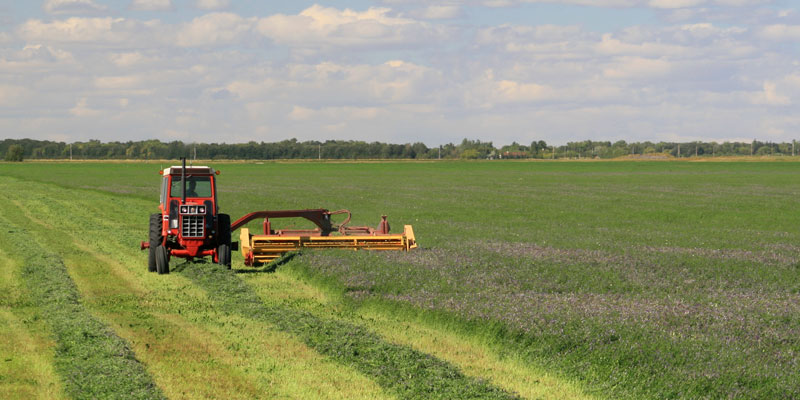Impacts of Alkaline Stabilized Biosolids Application on Fate and Transport of Emerging Substances of Concern in Agricultural Soils, Plant Biomass and Drainage Water
Principal Investigator - Gordon Price, Assistant Professor, Dalhousie University, 2013 - 2014

Challenge
The application of municipal biosolids to agricultural lands is a common practice in Canada. This process is beneficial in that it both helps with waste management and returns organic matter and nutrients to the environment. However, biosolids can contain organic chemicals, classified as Emerging Substances of Concern (ESOC). These substances can enter our ecosystems by degrading in soils, entering drainage and being taken up by plants. Through these factors ESOC pose a possible risk to environmental and human health.
Industry and government partners are concerned about how ESOC may enter food production systems. In order to develop effective policy and management frameworks for biosolids use, there needs to be systematic approach to compiling comprehensive evidence of the processes affecting the concentration, fate and transport of ESOC in agricultural landscapes.
Alkaline stabilization is a process that may reduce the concentration and number of ESOC. Though a possible solution, the current literature on alkaline stabilization as a way of reducing the effects of ESOC is insufficient and requires additional research.
The project team, led by Dr. Gordon W. Price, will investigate the impacts of alkaline stabilization on the fate and transport of ESOC in agricultural soils, plant biomass and drainage water.
Project
This project uses lab, field, and modelling approaches to investigate how alkaline stabilization impacts the concentration, fate, and transport of ESOC through soil, groundwater, and plant biomass.
This project will collect and analyze biosolids with and without alkaline stabilization treatment. This process will help determine the benefits of the alkaline stabilization process by quantifying the concentrations of ESOC pre- and post-treatment.
In a controlled greenhouse environment study, researchers will investigate how ESOC degrade, adsorb, and transport under varying soil conditions. Soil conditions include a variety of soil texture, pH, soil organic carbon, and soil water content.
Field studies for this project will be conducted through Dr. Price’s existing research program which includes three established field sites that have received biosolids from 2008 to 2012. This unique opportunity provides a time-integrated approach to assessing ESOC. Data from field studies will help understand ESOC transport through soil, groundwater, plants, and soil invertebrates over time.
Data collected in the lab and field will be used to develop ESOC fate and transport models. There are several models which could be adapted to simulated ESOC behaviour in agricultural soil systems. The development of modeling tools is a key component of this project, as it enables researchers to examine potential long-term effects (10+ years) of biosolids application on soil, water, and plants.
Outputs
Anticipated Outputs Include:
- Workshop/Symposium for industry and government partners to apply findings to decision-making context
- Semi-annual technical summaries delivered to partners to update on research progress and milestones
- Dissemination of project information via partner websites, social media and newsletters
Outcomes
A major concern of stakeholders involved in this project is an absence of data concerning the risks of ESOC through biosolids application. Through research this project seeks to address this concern by providing industry and government with greater knowledge on the impacts of alkaline stabilized biosolids application. This includes:
1. An understanding of how alkaline stabilization processes effect the concentration of ESOC in biosolids.
2. An understanding of ESOC degradation and transport behaviour in soils with varying characteristics.
3. An understanding of how agricultural systems receiving alkaline stabilized biosolids affect ecological health, soil quality, and water quality.
4. An understanding of potential long-term environmental impacts associated with alkaline stabilized biosolids.
5. Inform the development of government policies on biosolids management in agriculture, as well as food safety monitoring
To achieve this outcome, the team has planned face to face meetings with end users, as well as a workshop/symposium designed to inform the industry and government partners on the project findings as they apply to a decision-making context.
From this knowledge, industry and government will be able to develop an evidence-based position on the use of biosolids. Stakeholders involved in this project anticipate that this research will highlight the role of alkaline stabilization on the concentration and persistence of ESOC, and may influence public perception of biosolids.





